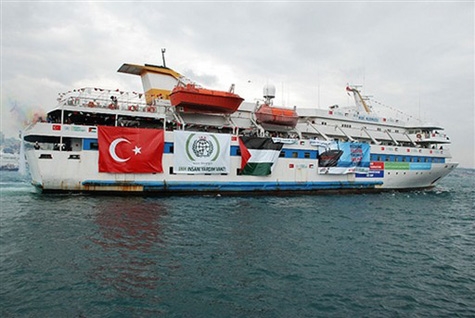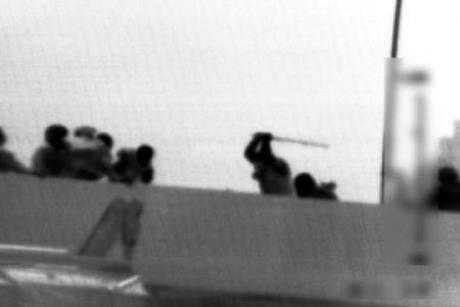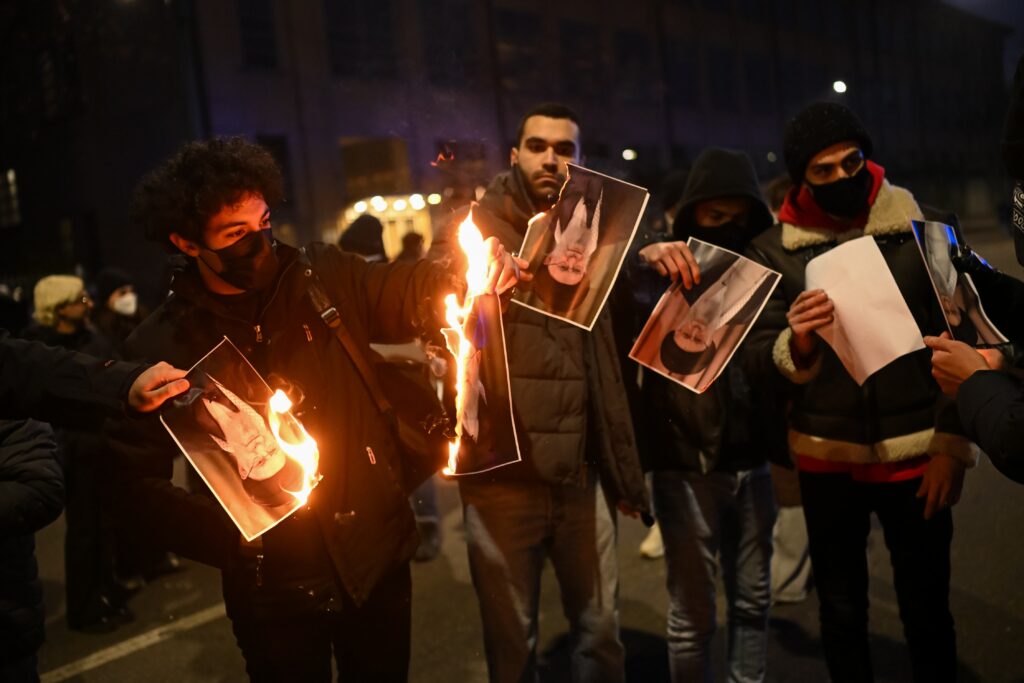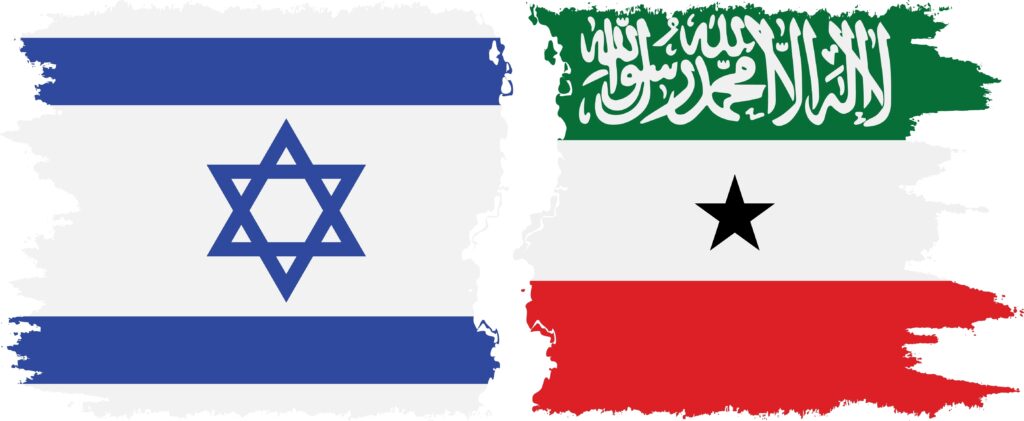FACT SHEETS
Fact Sheet: Israel’s naval blockade of Hamas (and the flotillas attempting to breach it)
November 27, 2025

Key points
- Israel’s naval blockade of Gaza is underpinned by international law.
- Israel is legally obliged to intercept all vessels attempting to breach the blockade.
- Enforcement of a blockade on the high seas (i.e. international waters) is permitted.
Contents
Summary
Israel has maintained a naval blockade of Hamas-ruled Gaza since January 2009. The blockade is legal under international law, as is Israel’s enforcement of it on those occasions when ‘flotillas’ have attempted to breach it. Indeed, because established international law says a blockade must be enforced against all ships, Israel is legally obliged to intercept the so-called ‘humanitarian flotillas’ that attempt to enter Gazan waters or else call off its blockade.
Since 2010, there have been numerous attempts by activists to breach the blockade. Israel has prevented each attempt by intercepting the vessels. On all such occasions, the humanitarian aid on the captured vessels was a drop in the ocean compared to the aid that Israel transfers through land borders into Gaza. Israel transferred aid captured from the flotillas into Gaza.
This fact sheet provides background to Israel’s blockade of Gaza, and the relevant international laws that underpin the blockade.
Read more: Flotilla sailed for confrontation, not for aid
The Blockade

Flotilla activist beating an IDF soldier in May 2010 (Image: IDF)
On 3 January 2009, Israel declared that it had imposed a naval blockade on Gaza, to prevent Hamas from obtaining weapons and other materiel that would aid its war effort.
This was not a siege, as Israel allowed and allows humanitarian aid to pass through land crossings into Gaza. Land crossings are used because they facilitate inspection of the goods to ensure that no military materiel is being smuggled into Gaza – such inspections are far harder at sea.
Efforts to breach the blockade
Activists have attempted to breach Israel’s naval blockade of Gaza in numerous flotillas, in 2010, 2011, 2015, 2016, 2018 and 2025. On each occasion, Israel has intercepted all vessels attempting to enter the blockaded zone.
On all such occasions, Israel forewarned the vessels that a blockade exists and that they should not attempt to enter the zone. Israel also offered to facilitate the transfer of all aid they were carrying into Gaza.
The 2010 flotilla carried approximately 10,000 tonnes of humanitarian aid, which was equivalent to about five days’ worth of goods that crossed the Gaza–Israel border at that time. Other efforts have contained considerably less aid. The aid in the 2015 attempt consisted solely of a solar panel and a nebuliser – a medical device that allows a patient, such as an asthma sufferer, to inhale medicine. A 2025 flotilla contained a “symbolic” amount of aid.
See more: Israeli navy addresses a ship in the May 2010 flotilla and offers it to dock in the Ashdod Port
Relevant Aspects of International Law

Then UN Secretary-General Ban Ki-moon (centre) meeting with the Panel of Inquiry on the Flotilla Incident on August 10, 2010 (Image: UN Photo/Mark Garten)
A July 2011 report commissioned by the United Nations, and empanelled by international legal experts, found that “Israel faces a real threat to its security from militant groups in Gaza. The naval blockade was imposed as a legitimate security measure in order to prevent weapons from entering Gaza by sea and its implementation complied with the requirements of international law (p.4).”
There are two key resources on relevant laws of armed conflict at sea, and both show that Israel’s blockade is legal. The first is the San Remo Manual. The second is the Newport Manual. Neither of these manuals are treaties or international laws, but are summaries and commentary of applicable international law, and are widely accepted as authoritative.
San Remo Manual
The San Remo Manual on International Law Applicable to Armed Conflicts at Sea, known as the San Remo Manual, was published in 1994. It was prepared by international legal and naval experts, in coordination with the International Committee of the Red Cross (ICRC). It summarises the laws of armed conflict applicable to conflict at sea.
According to the San Remo Manual, naval blockade is permitted pursuant to certain conditions, which Israel has met since its announcement and enforcement of its blockade of Gaza in January 2009. These are: that all parties are notified that the blockade exists (paragraph 93); that the blockade is effective (i.e. it is enforced) (paragraph 95); that it is applied to all ships (paragraph 100); that its sole purpose is not to starve the civilian population (paragraph 102); and that it allows humanitarian supplies to enter the blockaded area (paragraph 103).
The full text of the San Remo Manual is available on the ICRC website. Here are some relevant paragraphs:
Paragraph 67: “Merchant vessels flying the flag of neutral States may not be attacked unless they: (a) are believed on reasonable grounds to be carrying contraband or breaching a blockade, and after prior warning they intentionally and clearly refuse to stop, or intentionally and clearly resist visit, search or capture.”
It is of note that a publicly available Australian Manual of the Law of Armed Conflict (2006) refers to the San Remo Manual as an “international document of significance”. In its section on blockade (paragraph 6.41), the Australian Manual uses the exact text of the San Remo Manual’s Paragraph 67, above.
Continuing with relevant paragraphs from the San Remo Manual:
Paragraph 98: “Merchant vessels believed on reasonable grounds to be breaching a blockade may be captured. Merchant vessels which, after prior warning, clearly resist capture may be attacked.”
Paragraph 100: “A blockade must be applied impartially to the vessels of all States.”
Paragraph 103: “If the civilian population of the blockaded territory is inadequately provided with food and other objects essential for its survival, the blockading party must provide for free passage of such foodstuffs and other essential supplies, subject to: (a) the right to prescribe the technical arrangements, including search, under which such passage is permitted; and (b) the condition that the distribution of such supplies shall be made under the local supervision of a Protecting Power or a humanitarian organization which offers guarantees of impartiality, such as the International Committee of the Red Cross.”
Paragraph 104: “The blockading belligerent [i.e. Israel – ed.] shall allow the passage of medical supplies for the civilian population or for the wounded and sick members of armed forces, subject to the right to prescribe technical arrangements, including search, under which such passage is permitted.”
It is important to note that, because a blockade must be applied impartially to all vessels, Israel is required to intercept any and all vessels attempting to breach the blockade, even if they claim to be carrying humanitarian aid. (And, as paragraph 103 makes clear, Israel has the legal right to insist such humanitarian aid be transferred across land borders into Gaza.)
Newport Manual
Originally published in 2023 (then updated in 2025), the Newport Manual on the Law of Naval Warfare is a more expansive update of the San Remo Manual. In explaining the benefits of the Newport Manual, Just Security wrote,
Scholars from Australia, Germany, India, Japan, the United Kingdom and the United States produced the Newport Manual as a restatement of the law of naval warfare from the perspective of the state practice of major maritime powers. The best guide to how the law of naval warfare may be applied in a future conflict is to revisit what states have done in the past and capture those practices and lessons to inform future planning and operations.
Unlike the San Remo Manual, the Newport Manual provides a definition of blockade:
A blockade is belligerent operation intended to prevent vessel traffic from all States from entering or leaving specified coastal areas that are under the sovereignty, occupation, or control of an enemy. Such areas may include ports and harbors, the entire coastline, or parts of it. (s. 7.4.1)
Notwithstanding its longer discussion of blockade, the Newport Manual provides for the same conditions as the San Remo Manual. That is, that all parties must be notified (s. 7.4.2), that the blockade must be effective (s. 7.4.3), that it is applied to all ships (s. 7.4.4), and that its sole purpose is not to starve the civilian population (s. 7.4.5).
Enforcing blockades in international waters
Israel typically intercepts vessels attempting to breach its blockade of Gaza in international waters. Some commentators have claimed that this practice is illegal, citing the UN Convention on the Law of the Sea’s Articles 87 and 90, which concern freedom of navigation on the high seas.
However, this is an incorrect interpretation. The Convention on the Law of the Sea (UNCLOS) does not mention blockade, though blockade was an established legal principle and method of warfare before UNCLOS’s 1982 establishment. Further, UNCLOS did not invalidate blockade.
The San Remo Manual does not explicitly say that enforcement of blockades may, or may not, take place in international waters. It does, however, note in paragraph 135 that “enemy vessels, whether merchant or otherwise, and goods on board such vessels may be captured outside neutral waters.” Neutral waters, as defined by the San Remo Manual in paragraph 14, “consist of the internal waters, territorial sea, and, where applicable, the archipelagic waters, of neutral States.” That is, the term ‘neutral waters’ does not include international waters (or “the high seas”).
However, the Newport Manual is explicit in this regard. In its discussion on breaches and attempted breaches of blockade, it provides examples of what “are likely to constitute attempted breaches.” These include, “If a vessel sails towards the blockaded area with the intention of breaching the blockade.” (s.7.4.7) The Manual distinguishes attempted breaches of the blockade from actual breaches – that is, where a vessel crosses the line of blockade declared by the blockading state.
The Newport Manual adds, “Vessels… attempting to breach a blockade are liable to capture… Knowledge of the existence of the blockade is essential before a vessel may be considered to be in breach of blockade or attempted breach of blockade.”
In all cases where Israel has intercepted vessels attempting to breach the blockade in international waters, the vessels clearly stated their intention to breach the blockade, both on departure and when contacted by the Israel Defence Force.
The Newport Manual adds, “Assuming that there is a sufficient degree of probability of capture, the distance of the blockading force from the coast is not relevant.” (s.7.4.3)
The above appears to be accepted by the United Nations. The aforementioned July 2011 report that investigated the Israeli capture of vessels attempting to breach the flotilla in 2010 noted in paragraphs 82 and 109:
The fundamental principle of the freedom of navigation on the high seas is subject to only certain limited exceptions under international law. Israel faces a real threat to its security from militant groups in Gaza. The naval blockade was imposed as a legitimate security measure in order to prevent weapons from entering Gaza by sea and its implementation complied with the requirements of international law…
For Israel to maintain the blockade it had to be effective, so it must be enforced. That is a clear legal requirement for a blockade. Such enforcement may take place on the high seas and may be conducted by force if a vessel resists.
Justification for Israeli soldiers using force
Israel has used force when intercepting flotillas attempting to breach the naval blockade, most notably in 2010, when nine Turkish civilians were killed. However, the laws of armed conflict make clear that civilians who take up arms against soldiers forfeit their civilian protection status (i.e. they become combatants).
Convention (IV) relative to the Protection of Civilian Persons in Time of War, Geneva, 12 August 1949 [i.e. the Fourth Geneva Convention] says,
Article 5: “Where in the territory of a Party to the conflict, the latter is satisfied that an individual protected person is definitely suspected of or engaged in activities hostile to the security of the State, such individual person shall not be entitled to claim such rights and privileges under the present Convention as would, if exercised in the favour of such individual person, be prejudicial to the security of such State.”
Similarly, the Newport Manual makes clear the distinction between crew and passengers of a vessel. Passengers must be treated as civilians unless and until they
directly participate in hostilities, in which case they are treated in accordance with the interpretation of the DPH [Direct Participation in Hostilities] concept on land. This means that passengers in an enemy or neutral merchant vessel who attack a naval boarding team are not considered part of the crew of the vessel and thus are not entitled to POW status. They are liable to treatment in the same way as civilians directly participating in hostilities on land—which is to say that it is open to the capturing power to detain and treat them as criminals. (s. 10.6.2).
In 2010, when Israel boarded the Mavi Marmara, some passengers attacked Israeli soldiers and thus lost their immunity from attack.
Read more: The Palmer Report into the Gaza Flotilla
Tags: Gaza, Gaza Flotilla, Hamas, IDF, Israel, Turkey, United Nations





